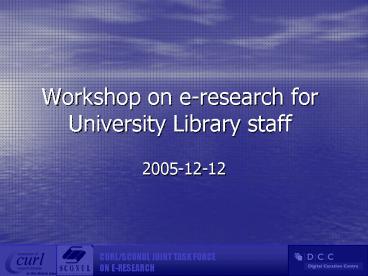Workshop on eresearch for University Library staff
1 / 19
Title:
Workshop on eresearch for University Library staff
Description:
'e-science is about global collaboration in key areas of big science and the next ... Stephane Goldstein, RIN (Observer) CURL/SCONUL JOINT TASK FORCE ON E-RESEARCH ... –
Number of Views:46
Avg rating:3.0/5.0
Title: Workshop on eresearch for University Library staff
1
Workshop on e-research for University Library
staff
- 2005-12-12
2
Introduction
- Martin Lewis
- University of Sheffield
3
What is e-science?
- e-science is about global collaboration in key
areas of big science and the next generation of
infrastructure that will enable it - Dr John Taylor, Director General of the UK
Research Councils, 2000
4
History
- UK e-science programme launched Nov 2000
- Allocations to individual research councils
- Core e-science programme administered by EPSRC
- Tony Hey, Director until Oct 2005
5
E-research key features
- Collaborative regional, national, global
- Multi-disciplinary and inter-disciplinary
- GRID technology
- Data
- quantity
- formats
- metadata
- annotation and re-use
- curation and preservation
6
Libraries
- Tony Hey challenge
- CILIP Update March 2004
According to Professor Tony Hey, head of the UK's
e-Science Core Programme, academic librarians
'are concentrating on only half the plot'. These
days, he says, his students in computing and
engineering, and others in scientific disciplines
like particle physics and astronomy, do not use
the university library much, if at all often
they use only the online journals, so 'there
needs to be a refocusing of what libraries do'.
This doesn't mean that university librarians are
redundant. Far from it - they have an absolutely
vital role to play, but it is one which many of
them currently ignore.
7
Libraries
- Tony Hey, contd
Librarians as digital curatorsThat's why
Professor Hey thinks that digital curation and
interoperability issues should be so much higher
up the agenda, why he despairs of what he sees as
the limited vision of the Consortium of
University Research Libraries and the Research
Support Libraries Group report (it looked
primarily at books and printed resources).
8
Task Force on e-research
- Tony Hey meeting with CURL Board July 2004 and
members Oct 2004 - 2005 CURL decision to establish Task Force
- proposal to SCONUL for joint Task Force (cf TF
on Scholarly Communications) - First meeting Feb 2006
9
Members
- Liz Lyon, UKOLN and DCC
- Martin Lewis, University of Sheffield
- John MacColl, University of Edinburgh
- Luiz Martinez, LSE
- John Owen, University of Birmingham
- Jane Savidge, Kingston University
- Mark Thorley, NeRC
- David Whitehurst, University of Manchester
- Jan Wilkinson, BL
- Carmen ODell, University of Sheffield (co-opted)
- Stephane Goldstein, RIN (Observer)
10
Key players in e-research
- RCUK
- National e-Science Centre
- Digital Curation Centre
- ESFRI (European Strategy Forumon Research
Infrastructures) - Current chair John Wood, CCLRC
- E-infrastructure reflection group (EU)
- Current chair Malcolm Read, JISC
11
Workshop objectives
- To enable delegates to be better informed about
the e-research landscape - To provide an insight into the technology that
supports e-research - To explore the role of university libraries in
supporting e-research - To identify further ways in which the TF can
support library staff
12
Workshop format
- Informal!
- Breakout groups after lunch
- A rapporteur Jane Savidge
- B rapporteur John Owen
- C rapporteur Carole Moreland
13
(No Transcript)
14
Libraries and e-research
- Posing some questions
15
Posing some questions
- What IS the role of university libraries in
supporting e-research?
16
Posing some questions
- Should e-research data be held locally or in
large-scale repositories? - Publication and re-use of data are likely to
become more important as research outputs in
their own right alongside published papers what
does this mean for libraries?
17
Posing some questions
- What skills are needed to manage and curate
e-research data? - Do we have them?
18
Posing some questions
- What are the risks of
- Getting involved?
- Not getting involved?
19
Posing some questions
- How will data management, access and curation be
funded?

